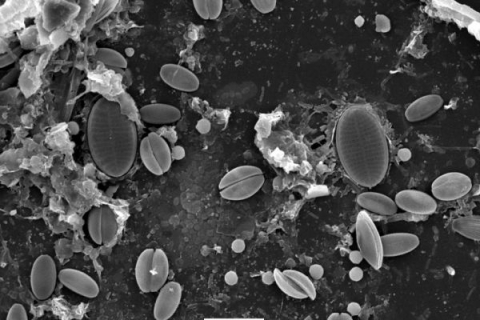

The report includes Portsmouth’s collaboration with English Heritage to prevent biofilms causing damage to historic buildings and artefacts.
17 December 2020
2 min read
The University of Portsmouth’s contribution to the UK’s biofilm community has been recognised in the National Biofilms Innovation Centre (NBIC) Annual Report 2020.
Portsmouth is one of 52 academic partner institutions in the NBIC, which brings together academia, industry and government bodies to tackle the global challenges biofilms present, worth more than $US5 trillion in worldwide economic activity, from food and health to ships, clean water and energy.
Biofilms are communities of bacteria that can grow on many different surfaces and are responsible for chronic bacterial infection, infection on medical devices, deterioration of water quality and the contamination of food.
The urgent need to tackle biofilms causing issues in almost every industrial sector, from food to medical, to energy to marine, has led to a united approach by UK-led scientists and industrial partners.
Dr Maria Salta, Senior Lecturer and NBIC lead for the University
The report covers key achievements to date, future plans, case studies and projects that NBIC is funding, including Portsmouth’s collaboration with English Heritage to detect and prevent biofilms causing damage to historic buildings and artefacts.
Dr Maria Salta, the NBIC leader for the University of Portsmouth, said: “NBIC’s latest annual report showcases a truly remarkable outcome from the collaboration between academia and industry to understand, predict, prevent and engineer biofilms. The urgent need to tackle biofilms causing issues in almost every industrial sector, from food to medical, to energy to marine, has led to a united approach by UK-led scientists and industrial partners.
“NBIC funding supported proof-of-concept projects with truly innovative ideas and technologies, while knowledge transfer to the next generation of scientists and inclusion of early career professionals was at the forefront of their targets. We are proud to be part of this important network to expand and transform the international research landscape in the understanding of biofilms.”
Dr Mark Richardson, NBIC CEO said: “NBIC is still a relatively young organisation but I am proud that we have achieved so much since our formation in late 2017. We were formed to support and connect the biofilm community across industry and academia in the UK. In the challenging circumstances we currently face globally, it’s clear that never has the importance of innovation and science been so critical.”
Dr Salta has been working for over a decade on biofilm research, including the initial stages of biofilm formation. Most recently, her research has been focusing on filling in the gaps on our understanding of biofilm community composition and function within the environment.
Dr Salta said: “It is now widely observed that microplastics in the marine environment are rapidly colonised by microorganisms that form biofilms. How these interactions affect the faith of these plastic microparcticles is largely unknown. I will be investigating this challenge in collaboration with my colleague Professor Simon Cragg in a new £6m research project to help to reduce the impact of plastic pollution on marine ecosystems in South East Asia.”
The University of Portsmouth’s biofilms research includes understanding the genetic, molecular and cellular basis of biofilms through to the discovery and development of novel technologies and methods for biofilm control, and across the medical and environmental sectors.
